Renewing Freedom Seder
(A song of welcome framing the event)
Circle ’round for freedom, Circle ’round for peace;
For all of us imprisoned, Circle for release.
Circle for the planet, Circle for each soul
For the children of our children, Keep the circle whole.
— Linda Hirschhorn
Seder: We call this a Passover Seder. Seder means ORDER. This is the order:
Kadesh, Holiness
Urechatz, Washing
Karpas, New Growth
Yachatz, The Bread of Brokenness
Magid, Story
Rachetza, Washing
Motzi Matzah, The Bread of Freedom
Maror, Bitterness
Korech, Combining the bitter with sweet
Shulchan Orech, Meal
Tzafoon, Redemption
Barech, Blessing
Hallel, Praise
Nirtzah, Closing
Lighting Candles We are the generation that stands between the fires. Behind us is the blaze of slavery and the smoke of indifference. Fires burned from the shacks for slaves on plantations and smoke leapt from the chimneys of Auschwitz.
Before us is the nightmare of fire, scorching our planet, burning down our democratic institutions. In the glare of gunfire from illegal weapons killing our children. In the burning anger of hatred and bigotry. It is our task to contain the fire. To transform the fire from an all-consuming blaze, into the source of light in which we see each other; each of us is different, all made in the image of God, and all worthy of a safe and healthy planet.
We light these candles, this flame, to see more clearly. That this earth and its people shall not be consumed by the fires. We light this flame to see more clearly the rainbow in our many-colored faces. Baruch Atah Adonai Elohainu Melech Haolam, Asher Kidshanu b’mitzvotav, vitzivanu, l’hadlik ner shel Pesach. Blessed are you, Adonai our god, Breathing Spirit of the Universe, who gives us light that we may become a light for peace and freedom and healing for all people and our planet.
* * * *
The traditional blessing for a holiday, or a special event is Baruch Atah Adonai Elohainu Melech Haolam, Shehecheyanu, V’keeyemanu V’higeeanu Lazman Hazeh. Blessed are you, Lord our God, Creater of the Universe, who has breathed life into us, lifted us up and carried us to this moment.
Seder Plates
We have two seder plates. The first follows the Jewish tradition; an egg for new life, greens for springtime, bitter herbs recalling the bitterness of slavery, Charoset mixture of nuts and apples mixed to look like the mortar used by slaves in building for Pharaoh and a bone from the Paschal lamb that was offered as sacrifice.
Today we also offer chef, author, Jewish man of color, and teacher Michael Twitty’s Afro-American Seder Plate, with foods that recall slavery in America; an egg for rebirth, with the upcoming easter holiday, a cornbread flat and pressed down, greens as a traditional health food for slaves, yams a staple of the African diet, chicken bones as slaves were only allowed to keep chickens, hot peppers for the sting of the master’s lash, a mixture of pecans and molasses, foods available to the slaves, and the orange which is a sphere showing the perfection of inclusion.
Kadesh/Sanctification [Pour a cup of grape juice.]
At a Passover Seder, four cups of wine are offered, representing the four ways God brought the children of Israel out of Egypt. For this seder, we focus on the transformation of slaves into free people. Today we will drink one cup of wine to honor four stages on the path to liberation. These cups are 1) becoming aware of oppression, 2) opposing oppression 3) imagining alternatives, and 4) accepting personal and communal responsibility to act.
Baruch Atah Adonai Elohainu Melekh Haolam, Borei Pri Hagafen.
Blessed are you, Ruler of the universe, creator of the fruit of the vine.
Urechatz / Washing Hands – (The first time)
We wash hands but do not say a blessing. At this point, we might not yet be ready to bless God for the cleansing benefits of water, while we have not yet escaped slavery and reached freedom in the dry desert. We symbolically wash hands. And then we offer this poem.
Blessed be the works of Your hands, O Holy One.
Blessed be the hands that have touched life.
Blessed be the hands that have nurtured creativity.
Blessed be the hands that have held pain.
Blessed be the hands that have embraced with passion.
Blessed be the hands that have tended gardens.
Blessed be the hands that have closed in anger.
Blessed be the hands that have planted new seeds.
Blessed be the hands that have harvested ripe fields.
Blessed be the hands that have cleaned, washed, mopped, scrubbed.
Blessed be the hands that have become knotty with age.
Blessed be the hands that are wrinkled and scarred from doing justice.
Marian Wright Edelman
Yachatz – This is the bread of brokenness, symbolizing the affliction of slavery. We break the bread and separate one part away from our table. [Someone lifts a sheet of matzah, breaks it in half, places it in an envelope and removes it from the room].
Maggid – The story of slavery and freedom is now told.
The traditional seder begins with four questions. These questions are to provoke discussion and gain insight. For today, we have four new questions. Select one of the four, turn to your neighbor and offer your thoughts. The four questions we ask today are these: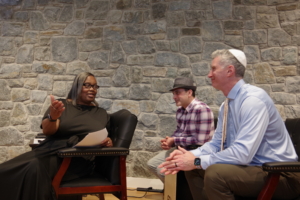
Why is this seder different from all other Passover seders?
How do we connect our lives with the bitterness of oppression, cruelty and servitude?
Why should we engage in these rituals, when there is so much work to be done?
Why do we go home to comfort, reclining in our contentment, while others are in peril?
God secured freedom for the Hebrews through a series of miraculous plagues. Turn to a person near you. What is a plague of the modern world that keep people enslaved? How will you commit yourself to not just see these plagues but also repair this brokenness?
The Story will continue in song. We begin with Moses confronting Pharaoh. We continue with the liberation through the sea. We trek through the desert, not knowing where our journey will end. And as always, we must keep our eyes on the prize!
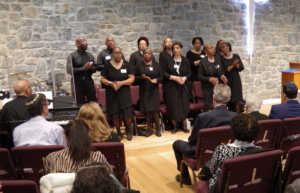
Go Down Moses
When Israel was in Egypt’s land, Let My people go; Oppressed so hard they could not stand, Let My people go; Go down, Moses, way down in Egypt’s land, Tell old Pharaoh: Let My people go!
The pillar of cloud shall clear the way, Let My people go; A fire by night, a shade by day, Let My people go. Go down, Moses, way down in Egypt’s land, Tell old Pharaoh: Let My people go!
As Israel stood by the water-side, Let My people go; At God’s command it did divide, Let My people go. Go down, Moses, way down in Egypt’s land, Tell old Pharaoh: Let My people go!
When they had reached the other shore, Let My people go; They sang the song of freedom o’er, Let My people go. Go down, Moses, way down in Egypt’s land, Tell old Pharaoh: Let My people go!
Wade in the Water
Wade in the water, Wade in the water, children,
Wade in the water, God’s a-going to trouble the water
See that host all dressed in white, God’s a-going to trouble the water
The leader looks like the Israelite, God’s a-going to trouble the water
See that band all dressed in red, God’s a-going to trouble the water
Looks like the band that Moses led, God’s a-going to trouble the water
Eyes on the Prize
Paul and Silas, bound in jail
Had no money for to go their bail
Keep your eyes on the prize, hold on
Hold on, (hold on), hold on, (hold on)
Keep your eyes on the prize, hold on!
Hold on, (hold on), hold on, (hold on)
Keep your eyes on the prize, hold on!
Paul and Silas began to shout
Doors popped open, and they walked out
Keep your eyes on the prize, hold on
Hold on, (hold on), hold on, (hold on)
Keep your eyes on the prize, hold on!
Well, the only chains that we can stand
Are the chains of hand in hand
Keep your eyes on the prize, hold on
Got my hand on the freedom plow
Wouldn’t take nothing for my journey now
Keep your eyes on the prize, hold on!
Hold on, (hold on), hold on, (hold on)
Keep your eyes on the prize, hold on! (repeat)
* * *
We must tell the story of slavery, but that is only the beginning. We must expand upon the story to reveal a vision of a better world of freedom and justice for all. In this way, the quest to end oppression continues. We begin that process with gratitude and praise.
When the Jews ascended from the Sea, they were grateful and raised their voices to offer songs of praise. After seeing God’s miracle, what else could the people do but turn to God in praise and song. That love of God is expressed in the Song of the Sea,
Mi Chamocha B’aylim Adonai, Mi Kamocha Nedar Bakodesh,
(Who is like you God, Revered in holiness and praise)
Norah Tehilot Oseh Feleh, (repeat)
(Wonderous are the miracles you made).
Won’t you help me sing, these songs of freedom,
all I ever have, Redemption Song. Redemption Song (B. Marley)
Dayenu – The most popular of the traditional Passover Seder songs comes just after the story of freedom is told. It is a song of enoughness. As we acknowledge the gifts God has given we are asked to hold a feeling of enoughness, to affirm the blessings we received and for a moment of appreciation, ask for nothing more. The chorus is one word – Dayenu, it is enough for us.
Ilu ho-tsi, ho-tsi-a-nu, Ho-tsi-anu mi-Mitz-ra-yim Ho-tsi-anu mi-Mitz-ra-yim Da-ye-nu! (Had we not been taken out of Egypt, it would’ve been enough!)
Chorus: Da-da-ye-nu, Da-da-ye-nu, Da-da-ye-nu, Da-da-ye-nu, Da-ye-nu Da-ye-nu
Ilu na-tan, na-tan la-nu, Na-tan la-nu et-ha-Sha-bat, Na-tan la-nu et-ha-Sha-bat, Da-ye-nu! (Had we not been given the Sabbath, it would have been enough!)
(Chorus)
Ilu na-tan, na-tan la-nu, Na-tan la-nu et-ha-To-rah, Na-tan la-nu et-ha-To-rah, Da-ye-nu! (Had we not been sent the Bible, it would have been enough!)
(Chorus)
Washing with a Blessing
Washing is a health act – We wash our hands as an act of cleanliness and prevention of disease. We wash not only for our own healthcare but with respect for the people around us. As we all learned in this decade, the best first-line defenses against most viruses are the ones that Grandma and common sense taught us, hand washing.
Washing is a spiritual act – When the angels visited Abraham and announced the birth of his son Isaac, Abraham greeted them by washing their feet, symbolic of their status as honored guests. Jesus washed the feet of his disciples during the Last Supper as a demonstration of humility and service.
These acts of washing are marked with a blessing. (One person holds out hands for washing while the other pours water over them three times.)
Baruch Atah Adonai, Eloheinu Melekh Haolam, Al Netilat Yadaim.
Blessed are you source of life, as we lift our hands in blessing.
Matza “Why do we eat this pressed-down bread?“ Because it begins as the bread of affliction, the bread of a pressed-down people—but becomes the bread of Freedom when we move toward resistance. We are so consumed with freedom that we rush to bake the bread without time for the bread to rise, We lived then and now we live, as Dr. King taught, in the “fierce urgency of NOW!”—swiftly moving toward our liberation.”
(The leader breaks off a piece of the matzah)
Why do we break the matzah? Because the world is a broken place. And why do we share the matzah? Because if we do not share it, it remains the bread of affliction; when we share it, it becomes the bread of freedom. This year we share in a world of greed and war, but we pledge to work together so that we can share and celebrate in a world of justice and peace.
Barukh Atah Adonai, Elohainu Melech Haolam, HaMotzi Lechem Min Haaretz.
Blessed are You, Breathing-Spirit of the world, who through sun and soil, seed and human toil, brings forth this bread from the Earth. The leader eats some matzah
Maror [The leader takes a piece of raw horseradish] This bitter herb recalls the bitterness of slavery. The legacy of slavery is the impact on us today, systemic racism, economic inequality and social injustice. Yet, an estimated 50 million people still live in slavery around the world. Dehumanized, losing their identity, stripped of humanity, reduced to poverty, denied basic rights of self-determination and agency, families torn apart, children separated from parents, spouses separated from spouses, no rights to own property, to marry, living in fear of violence and abuse. The bitter herbs of Passover remind us of enslavement of the past, the ongoing suffering today, and that slavery yet endures.
Baruch atah Adonai, Eloheynu Melech haolam, Asher kidishanu b’mitzvotav, vtzivanu Al a-chilat maror.
“Blessed are You, Creator of the Universe, Who brings forth the fruit of the earth — without the bitter we might never appreciate the sweet.” [Leader eats a chunk of horseradish.]
We join together at this season of Passover and Easter to connect our separate stories in the hope of telling new stories, stories of freedom, stories of dignity, and stories of justice. We must carry on. We begin this process on this very day. Our telling cannot end today. We continue on this journey and pray that One Day all will be well, all will be safe, all will be free.
Closing Songs –
Woyaya
One Day

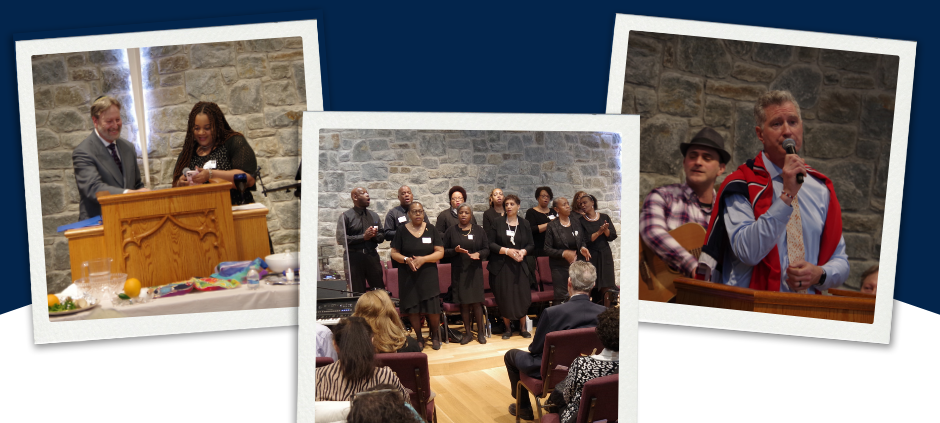
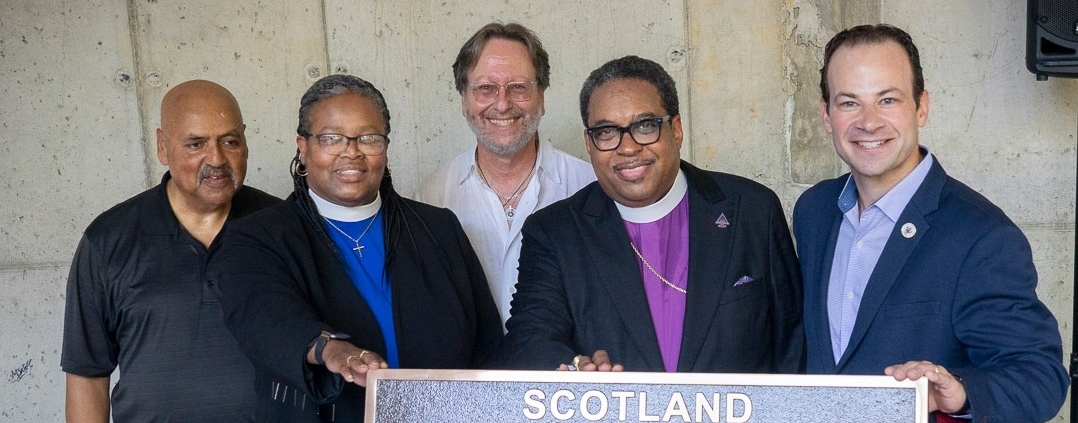

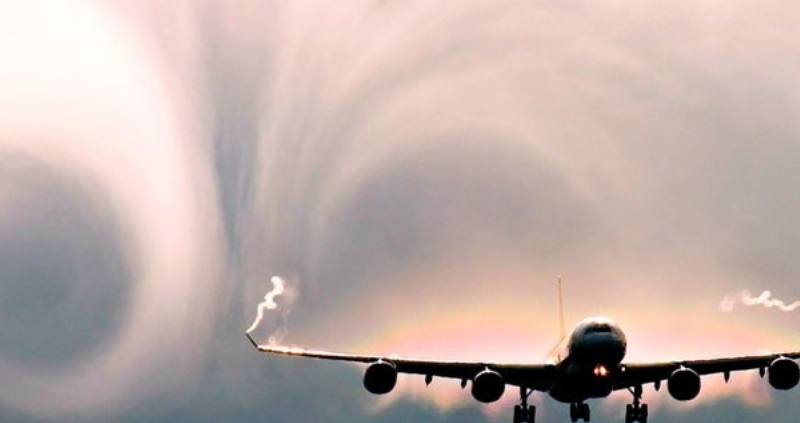

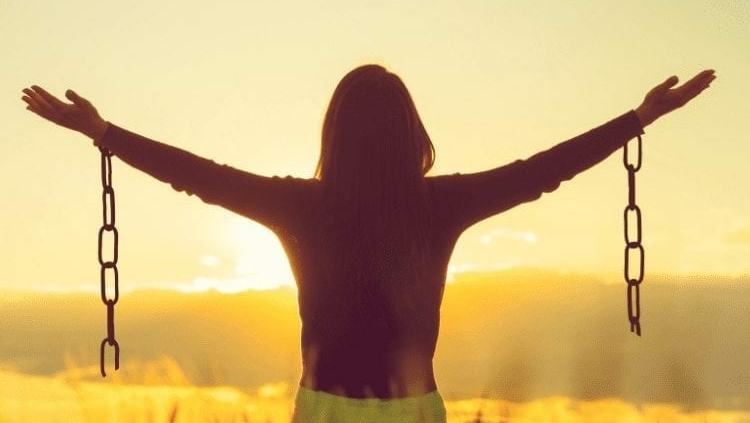
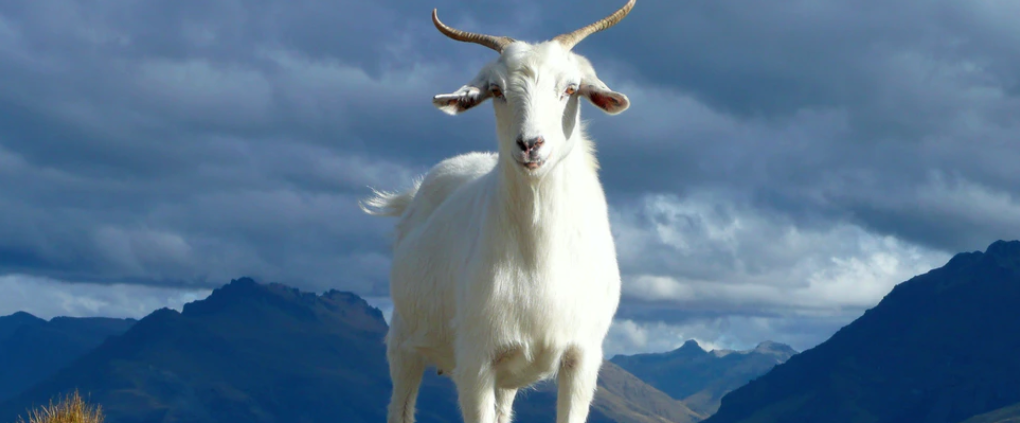
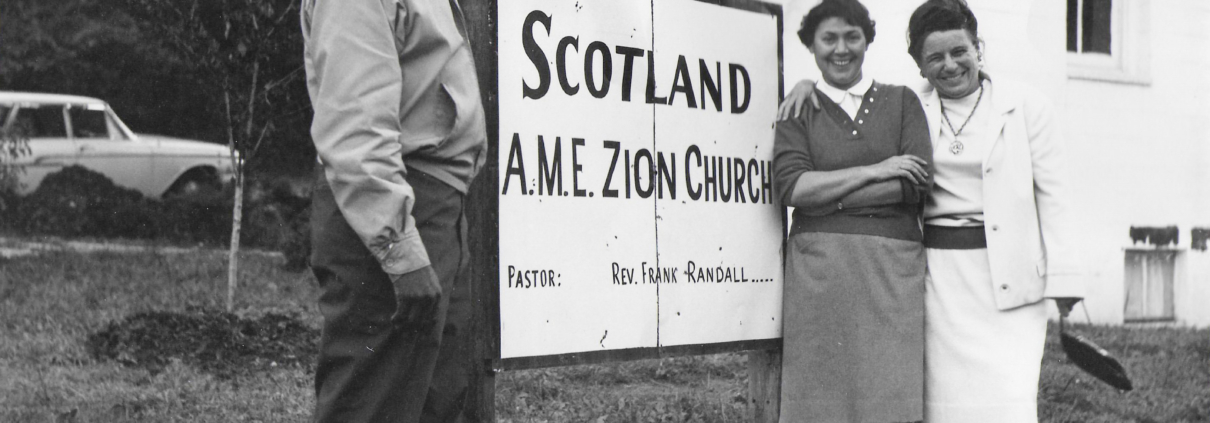
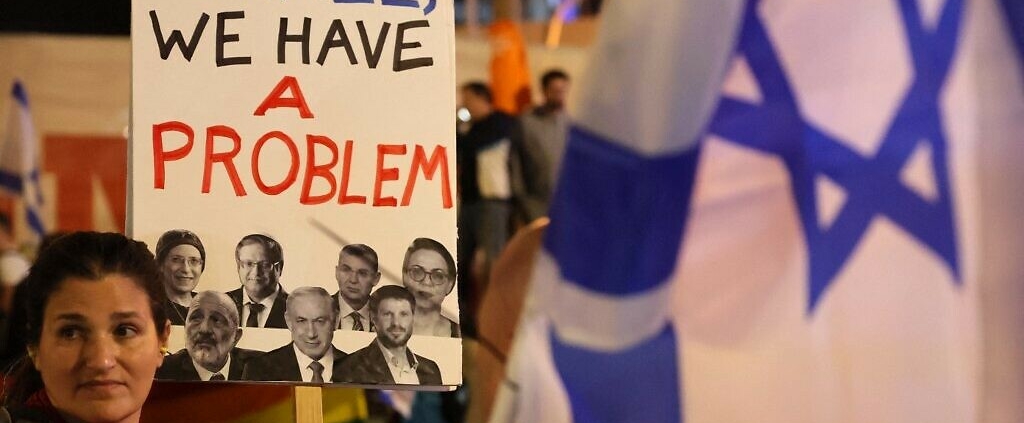


 Evan J. Krame was ordained as a rabbi by the
Evan J. Krame was ordained as a rabbi by the